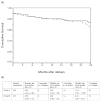Prolonged breast-feeding and mortality up to two years post-partum among HIV-positive women in Zambia
- PMID: 16184038
- PMCID: PMC1393280
- DOI: 10.1097/01.aids.0000186817.38112.da
Prolonged breast-feeding and mortality up to two years post-partum among HIV-positive women in Zambia
Abstract
Background: A previously reported association between prolonged lactation and maternal mortality has generated concern that breast-feeding may be detrimental for HIV-positive women.
Methods: As part of a trial conducted in Lusaka, Zambia, 653 HIV-positive women were randomly assigned either to a counseling program that encouraged abrupt cessation of breast-feeding at 4 months (group A) or to a program that encouraged prolonged breast-feeding for the duration of the woman's own informed choice (group B). We examined whether mortality up to 2 years post-partum increased with breast-feeding for a longer duration.
Results: There was no difference in mortality 12 months after delivery between 326 HIV-positive women randomly assigned to short breast-feeding [group A: 4.93%; 95% confidence interval (CI), 2.42-7.46] versus 327 women assigned to long breast-feeding (group B: 4.89%; 95% CI, 2.38-7.40). Analysis based on actual practice, rather than random assignment, also demonstrated no increased mortality due to breast-feeding.
Conclusions: Although HIV-related mortality was high in this cohort of untreated HIV-positive women, prolonged lactation was not associated with increased mortality.
Figures

References
-
- Humphrey J, Iliff P. Is breast not best? Feeding babies born to HIV-positive mothers: bringing balance to a complex issue. Nutr Rev. 2001;59:119–127. - PubMed
-
- Coutsoudis A, Coovadia H, Pillay K, Kuhn L. Are HIV-infected women who breastfeed at increased risk of mortality? AIDS. 2001;15:653–655. - PubMed
-
- Newell ML, Read J, Leroy V, Dabis F. Mortality among HIV-infected mothers and children’s feeding modality: The Breast-feeding and HIV International Transmission Study (BHITS).Second IAS Conference on HIV and Pathogenesis, Paris, France: July 2003.
-
- Sedgh G, Spiegelman D, Larsen U, Msamanga G, Fawzi WW. Breastfeeding and maternal HIV-1 disease progression and mortality. AIDS. 2004;18:1043–1049. - PubMed
Publication types
MeSH terms
Grants and funding
LinkOut - more resources
Full Text Sources
Medical
Research Materials

